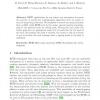331 search results - page 56 / 67 » Provably Secure Timed-Release Public Key Encryption |
STOC
2005
ACM
14 years 7 months ago
2005
ACM
Our main result is a reduction from worst-case lattice problems such as GAPSVP and SIVP to a certain learning problem. This learning problem is a natural extension of the `learnin...
CCS
2007
ACM
14 years 1 months ago
2007
ACM
In this paper we propose a new voting protocol with desirable security properties. The voting stage of the protocol can be performed by humans without computers; it provides every...
CCS
2008
ACM
13 years 9 months ago
2008
ACM
Data sharing on public servers has become a popular service on the Internet, in which users can store and share data with other users through public servers. However, because the ...
ICALP
2009
Springer
14 years 7 months ago
2009
Springer
Consider a center possessing a trusted (tamper proof) device that wishes to securely compute a public function over private inputs that are contributed by some network nodes. In ne...
CHES
2007
Springer
14 years 1 months ago
2007
Springer
RFID applications do not always use encryption to ensure the security as public key cryptographic algorithms that are costly in term of computing resources. We proposed to secure t...



